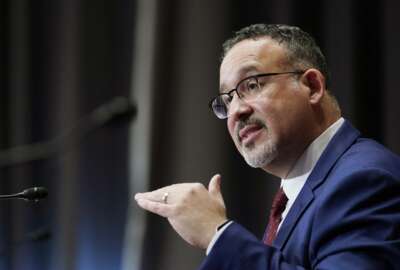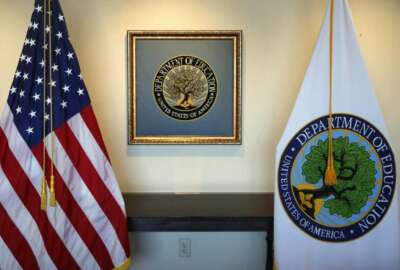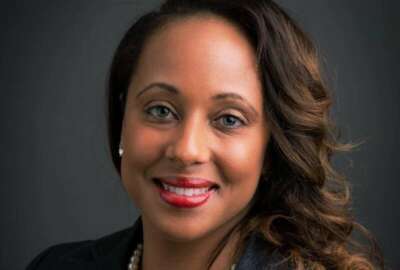

Waste, fraud and abuse in the federal student aid loan program is bad. But it would be a lot worse, if not for someone at the Government Accountability Office (...
Waste, fraud and abuse in the federal student aid loan program is bad. But it would be a lot worse, if not for someone at the Government Accountability Office (GAO) For more than 20 years, she has dispensed tough and crucial oversight to federal financial aid for students, which has rooted out fraudsters and saved untold sums of money. Now she is a finalist for a Service to America Medals, administered by the Partnership for Public Service. Federal Drive with Tom Temin talks with Melissa Emrey-Arras, the GAO’s Director of Education, Workforce and Income Security Issues.
Interview Transcript:
Tom Temin And this has really been kind of a crusade in some sense for you. The Education Department’s loan programs has been your specialty for how long now?
Melissa Emrey-Arras Over 21 years, Tom.
Tom Temin Wow. So you have seen a lot happen. And there’s some specific situations that you’ve kind of rooted out. Talk about people that are simply ineligible for student aid that nevertheless got it. How did you discover that and what happened when you presented this to the Education Department?
Melissa Emrey-Arras That’s a great question, Tom. We looked at students who did not have high school diplomas or GEDs and were trying to go to college. And the idea was that you could go to college if you didn’t have a GED or a high school diploma, if you passed a basic math and English test. And we decided to see if that was working. And it’s hard to believe this, but at GAO, we actually had staff pretend to be students and then had them purposely fail the test to see what would happen.
Tom Temin That’s funny.
Melissa Emrey-Arras You think going to work for the government, you’re not going to do something like that. But you can! You can work for the government and do cool undercover and investigative work. And that’s what we did. We had staff pretend to be students and we hook them up with microphones and we sent them in to take this test of basic math and English skills and see what would happen if they tried to fail the test. What was shocking to us was that the proctor was giving out the answers from the get-go. In fact, we had a recording that has the proctor saying, it is not D, it is not C, it is not A, so it is B. Number one is B. Which was just completely incredible to us that the test proctor, who was charged with making sure that the test was done correctly, was in fact giving out the answers from the beginning.
Tom Temin Was this person a contractor? Was an Education Department employee? I mean, how did this type of situation develop in the first place?
Melissa Emrey-Arras They worked for a college and there was an incentive for the college to enroll more students so the college would receive federal student aid. So the college could line its pockets if it could get more students in the door. But it’s not it’s not a good situation. It’s not good for the student if the student doesn’t know basic math and English. And it’s certainly not good for taxpayers who are funding a college education for someone who really isn’t ready for it.
Tom Temin Right? I would say, yeah. Education Loans for Dummies is probably not a great program. It seems like you were able to discover two things, really, if you look at this carefully. One is that there was fraud going on, just outright cheating by the proctor. But also that the incentives built into the program might have been a little bit off.
Melissa Emrey-Arras Definitely. Definitely. And we found that similarly in terms of college officials helping prospective students get fake high school diplomas. I’m just going to say that again, we have found situations where college officials were helping people get fake high school diplomas so they could enroll in the college and again, get federal student aid from the federal government. Again, that’s not the way it’s supposed to be. You think that college should be for people who’ve completed high school who have the skills, and at that point, it makes sense for them to go to college. But it’s completely inappropriate and fraudulent to go that route and we crack down on it. And because of that, there are many more controls in place now to prevent those kinds of frauds from happening. And that’s what we do at the Government Accountability Office. We fight fraud. And I’m so proud to have done that in the higher education space.
Tom Temin We’re speaking with Melissa Emrey-Arras. She’s director of education, workforce and income security issues at the GAO and a finalist in this year’s Service to America Medals Program. And in another case, you found that there were college students who were deserving of loans, but they had no permanent housing and therefore they couldn’t verify their status. So your work has been on behalf of the recipients of these programs also.
Melissa Emrey-Arras That’s true. We’ve done a lot of work to help vulnerable students go to college and stay in college. And one of the studies that we worked on, we found that college students were living in cars, tents and being on other people’s couches because they didn’t have a place to stay. And when you’re in that situation, you don’t get paperwork that says, I’m officially homeless. You’re just trying to get through the day and sleep wherever you can. And yet those students were getting tripped up by all the rules and requirements because they didn’t have documentation that they were homeless. They may have had documentation that they were homeless from high school, but when they got to college, they didn’t have that. And because of that, they were struggling to stay in college. Their financial aid was getting turned off. They were being dropped from courses, which was just heartbreaking. I mean, if you think about the lengths that these students went to to stay in college, like sleeping in a car or sleeping in a tent and then going to classes during the day and then not being able to get your financial aid because you don’t have paperwork that says you’re homeless. It was just tragic. And in our work, we found a way to change that so that we recommended that once a student was identified as homeless, often from their high school experience, that they be considered as continuing to be homeless unless someone had evidence to the contrary. And because of that, homeless college students can now have access to federal student aid and hopefully change their life trajectory.
Tom Temin Well, you’ve done many other investigations and oversight work in different areas of this whole program. My question is, how have relations been with the Education Department? The political leadership has come and gone in 20 years. You are there in a kind of continuous way, a steady way. And what do they say when you say, did you know this is going on?
Melissa Emrey-Arras That’s a great question. It can depend on the study. Sometimes we have a warmer reception to our findings than other times. But I do need to give the Department of Education credit. They implement our recommendations in education at a much higher rate than the overall rate for the government. So they are doing a good job of implementing our recommendations and it is so gratifying to see big changes in programs and big changes in the lives of students because of these changes.
Tom Temin And more recently, you have done work to make sure that people eligible for the forgiveness programs, in fact do receive that forgiveness. Legally they’re entitled to it. And at one point, 99% of the applications were being turned down, including most of the eligibles.
Melissa Emrey-Arras That’s right. We had done work at the very beginning of the Public Service Loan Forgiveness program to see how it was functioning. And it was so frustrating. We found that 99% of applicants were being denied for the program. And because of that, we made recommendations to improve the program, to streamline it, and to help make sure that borrowers have the information they need to know if they are eligible. And I think that has made a tremendous difference in terms of the Public Service Loan Forgiveness program. In addition, there are other forgiveness programs that we’ve looked at. For example, last year we looked at a program that provides forgiveness after a period of time where people are on what are called income-driven repayment plans, where people pay a lower amount based on their income. And then after 20 or 25 years, the government is supposed to forgive their balances if they’ve made all their appropriate payments. And what’s really interesting about that program is that it’s not an application for forgiveness. The borrower doesn’t say, I’ve made my 20 or 25 years of payments, please forgive my loans now. It’s actually the government’s responsibility, the Department of Education’s responsibility to keep track of those payments. And then when the time comes, to provide the forgiveness for the balances. But unfortunately, we found last year that that wasn’t happening. We found that the government had, quite frankly, lost track of payments. They had lost track of payments over many years. They had lost track of payments over multiple administrations. And because of that, there were many people who would be potentially eligible for full forgiveness from the income-driven repayment plan. But were still making payments every month.
Tom Temin Crazy.
Melissa Emrey-Arras Which is so concerning, especially in a situation where you would hope that you could trust the government to keep track of the payments and provide the forgiveness as it was promised. But that wasn’t happening. And because of our work, the Department of Education decided to make really significant changes. And you had asked about the department’s openness to our work. And in that case especially, I would say that the department was very responsive to our work and decided to do a one time adjustment to all of the folks in those income driven repayment plans, and that is going to help over three and a half million borrowers get closer to forgiveness.
Tom Temin And just a final question in the larger sense. When you look at the cost of college and the government’s almost $2 trillion program to help people go to these colleges, do you ever wonder, is the government maybe fueling the demand for this commodity which is overpriced because most colleges have more administrators sitting around on their keisters than they have professors and bazillion dollar stadiums and sports programs? Do you ever wonder, like, what are we paying for here?
Melissa Emrey-Arras That is a significant concern because you want to make sure that the cost is necessary, right. You want to make sure that taxpayer dollars are well spent. And because of that, we think it’s important that colleges actually disclose how much they cost to students when students are considering going to them. And we did a study last year which was so concerning. We did a study that looked at the financial aid offers. These are the the letters that students receive when they’ve been accepted. And the letters say how much the college costs and how much aid the student will get, or at least that’s what you would think that they would say. But what we found was that over 91% of colleges were not providing the full actual cost of the college in these offers to students. And what that means is that students and their families don’t have the information that they need to make that decision upfront as to whether or not they can afford that college. Because of that, we made a recommendation to Congress, which I have to say is pretty rare. Usually we make recommendations to federal agencies. But in this case, we made a recommendation to Congress that Congress require colleges to fully disclose the actual cost to students in those financial aid offers. And because of that, there is now legislation being considered on the Hill to do that.
Tom Temin Yeah, because the government has gone after the for-profit schools. But really, if you look at the rest of the .edu world, that it’s not exactly a primrose squeaky clean situation either, is it?
Melissa Emrey-Arras No, it’s not. And because we found that 91% of colleges were not informing students and their families of the real cost. It shows that it’s not just one sector of education. It’s not just the for-profits. It’s not just the nonprofits. It’s all sectors of education that can really fuel the loan challenges that a lot of people face. If you sign up for a college thinking it’s going to be a certain amount. And then when you show up on campus and you find out it’s $10,000 more because they never told you what the housing cost was going to be, you might need to take out a loan for that that you weren’t planning on.
Copyright © 2024 Federal News Network. All rights reserved. This website is not intended for users located within the European Economic Area.
Tom Temin is host of the Federal Drive and has been providing insight on federal technology and management issues for more than 30 years.
Follow @tteminWFED



